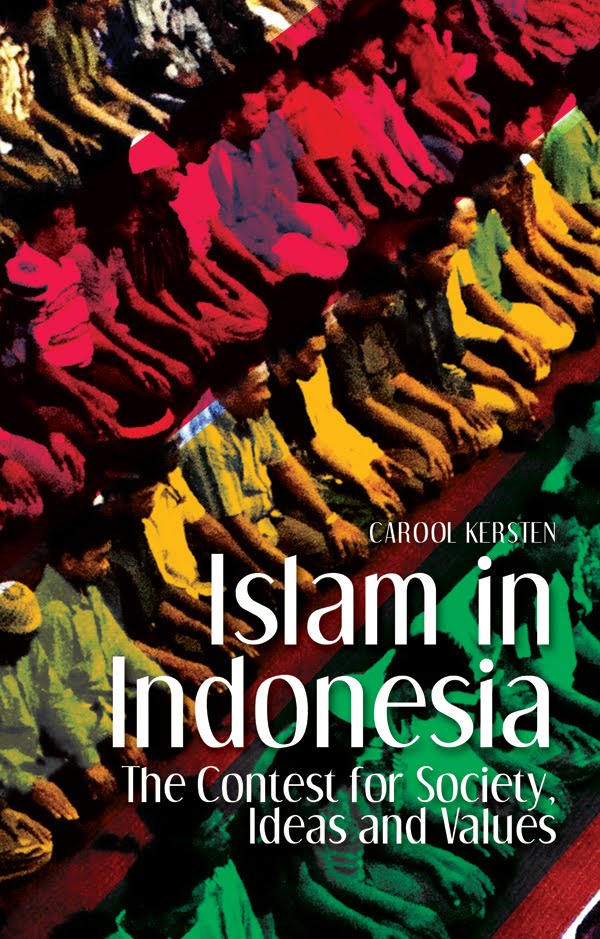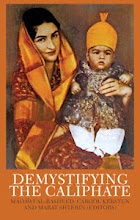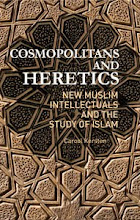Friday 19 November 2010
NEW ACADEMIC SOCIETY OF CONTEMPORARY THOUGHT IN THE MUSLIM WORLD
On 16 November 2010, four US-based scholars launched the Society of Contemporary Thought and the Islamicate World (SCTIW). Alina Gharabegian, Seema Golestaneh, Jason Mohaghegh, and Lucian Stone want to 'promote new directions in scholarship and creative activities related to the interface of Eastern and Western movements' by establishing a multi-disciplinary network of 'professional academics representing a diverse array of fields'. This diversity is already reflected by the backgrounds of the initiators, New Jersey City University Assistant-Professors Gharabegian and Mohaghegh work in the fields of English literature and World literature respectively, but their interests also include contemporary Armenian literature, 'Middle Eastern interpretations of the elegy', and contemporary avant-garde circles in the Middle East. Seema Golestaneh is a PhD candidate in social anthropology at Columbia University working on contemporary Sufism in Iran (see also the post of 27 August on this blog). Stone, now an Assistant-Professor of Philosophy at the University of North Dakota is not only a specialist on the philosopher Simone Weil, but was also involved in the Library of Living Philosophers project, contributing to the volume on the Iranian-born thinker Seyyed Hossein Nasr.
Although its geographical remit indicates that the society wishes to showcase developments in the Islamicate world, the Society regards it as 'a kind of limitless zero-world, a vast territory of thought, experience, and imagination'. This open interpretation combined with the involvement of scholars not confined by the philological-historical inclinations which for so long determined the way Islam and the Muslim world was studied holds great potential of innovative and original ways of engaging with the pluralist civilizational heritage of the Muslim world.
At present membership is free, to register click here.
For a flavour of what might be in store for the future, here are some of the publications by members of the steering committee:
Although its geographical remit indicates that the society wishes to showcase developments in the Islamicate world, the Society regards it as 'a kind of limitless zero-world, a vast territory of thought, experience, and imagination'. This open interpretation combined with the involvement of scholars not confined by the philological-historical inclinations which for so long determined the way Islam and the Muslim world was studied holds great potential of innovative and original ways of engaging with the pluralist civilizational heritage of the Muslim world.
At present membership is free, to register click here.
For a flavour of what might be in store for the future, here are some of the publications by members of the steering committee:
Wednesday 10 November 2010
SECOND THOUGHTS? AN ASSESSMENT OF ISLAM AND STATE IN INDONESIA
LSE IDEAS, the centre for the study of diplomacy, international affairs and strategy at the London School of Economics, hosted a seminar on Islam and the State: A Southeast Asian Perspective, featuring Dr. Bahtiar Effendy, a lecturer at State Islamic University (UIN) Syarif Hidayatullah in Jakarta, with Prof. Gilles Kepel, Director of the Moyen/Orient/Méditerranée Programme at Sciences Po in Paris and holder of the Phillipe Roman Chair in History and International Affairs, acting as discussant, and Tan Sri Dr Munir Majid, head of the Southeast Asia International Affairs Programme at LSE IDEAS, in the chair.
Dr Effendy's talk was largely based on his book Islam and the State in Indonesia (2003), a published verion of his PhD thesis at Ohio State University, defended in 1994. Notwithstanding the fact that Indonesia's political landscape has changed unrecognizably since the fall of Soeharto's New Order Regime, Effendy's study has only been updated with a relatively brief 'post-script' containing just a summary discussion of developments from 1999 to 2000. While earlier parts of the book contain valuable discussions of the role of a new Muslim intelligentsia in creating the 'New Islamic Intellectualism' of the 1970s and 1980s, which transformed the debate on religion and politics from a legal-formalist and exclusivist into a substantialist and inclusivist discourse, there is no mention of the rise of two ensuing generations of Muslim intellectuals, consisting of scholars from the State Islamic Universities in Jakarta and Yogyakarta (including Effendy himself) and younger intellectual-activists connected through networks such as the Jaringan Islam Liberal (JIL, Liberal Islam Network) or associated with the young cadres of the Nahdlatul Ulama (NU), referred to as NU Muda. Part heirs, part critics of the pioneers of this substantialist Islamic discourse they have been instrumental in the further shaping of an Indonesian variant of Islamic civil society.
 |
| Dr Bahtiar Effendy |
Also from Effendy's presentation it was difficult to get a clear sense of where he sees Indonesia going. Having identified the early twentieth-century, the end of the Cold War, and post-9/11 as three key moments when the discussion of the relation between Islam and modernity and between religion and politics became particularly acute, he then restricted his discussion primarily to the domestic Indonesian context.
Throughout the Soekarno and Soeharto years, Islamic political parties were considered as potential contenders for political power and were therefore clamped down on. Only in the 1950s, when a system that can be described as liberal and democratic was allowed to briefly flourish, were Islamic parties able to profile themselves uninhibitedly. This was reflected by their unsurpassed success in the 1955 elections, when the four Islamic parties together received 43% of the vote --- still, not a majority in a country that is 85-90% Muslim. Evidently, even then, large segments of Indonesia's Muslim intelligentsia did not want Islam as the basis for statehood.
The New Order Regime approached the Islam with the same suspicion as Soekarno had in the 1940s and during the 'Guided Democracy' of his later years. Islamic Parties were generally reduced to an outsider role in the political process It was not until the 1970s, when this earlier mentioned new generation of intellectuals and technocrats formulated a non-formalist alternative Islamic discourse. Because it was no longer regarded as explicitly anti-state the state allowed more room for this kind of activism. In fact, the Muslim intelligentsia were not only co-opted in the government's development policies; eventually the state itself saw the usefulness of religion for driving its own objectives. and began boosting its own Islamic credentials. The power of Islamic courts was strenghtened in regards to personal and family law, the country began experimenting with Islamic banking, and the government established a kind of Islamic think tank, the 'Indonesian Association of Muslim Intellectuals' (Ikatan Cendekiawan Muslim se-Indonesia, ICMI), led by Minister of Technology and later Vice-President and President B.J. Habibie.
In the democratic transformation that followed the fall of Soeharto in 1998, more than 181 new political parties emerged, of which 42 bore an Islamic or Islamist signature. It also spelled the return of the legal-formalist political and religious discourse. There was a sense of deja-vu, as it became clear that the Islamic parties still bore a historical stigma, according to Effendy. The majority of the Muslims preferred a substantialist understanding over the legalist interpretations associated with political Islam. As an explanation for this hesitation, Effendy suggests that three factors played a role: the fear it may thwart Muslim social mobility, the fragmentation of the community due to the competition between a plethora of Islamic parties, and the sense of alienation felt by younger generations of Muslims, who never experienced the struggles during the first fifty years of independence. Again, elections results reflected these sentiments. Between 1968 and 1998 support for Islamic parties oscillated between 15 and 30%. In the three free elections that have been held since then the Islamic parties received 37% (1999), 38% (2004) and 24% (2009) of the votes.
Effendy concludes that the intellectual transformation effectuated between 1970 and 1990 still dominates at the expense of the advocates of a legal-formalist Islamic model: The Jakarta Charter of 1945 (forcing Muslim citizens to abide by Islamic law) was never inserted into the constitution and only select elements of Islamic law have been implemented. As long as Muslim politicians do not disrupt the idea of a nation state they wuill be allowed some maneuvering space, but the exact place of Islamic principles in the political constellation is still not defined. Whereas Effendy expresses the hope that political and religious elites will reach an appropriate settlement, he gives no indication what such an agreement should encompass. Nor did he tell anything about the vibrant intellectual milieu in which younger scholars, intellectual-activists, and writers current discuss possible scenarios for a future civil Islam.
 |
| Prof Gilles Kepel |
As the author of Jihad: The Trail of Political Islam , Gilles Kepel responded by providing a wider context by drawing on examples from other parts of the Muslim world. Comparing developments in Indonesia with those in Turkey and Algeria, he sees similarities in the implicit association of Islam by its detractors as threatening to the nation-state and a step backwards, or their use of political Islam as the scapegoat hampering state-building and development. However, when political opponents of authoritarian regimes want to challenge the incumbents they often opt for employing an 'Islamic vocabulary', although this must not be automatically equated with legal-formalist aspirations.
, Gilles Kepel responded by providing a wider context by drawing on examples from other parts of the Muslim world. Comparing developments in Indonesia with those in Turkey and Algeria, he sees similarities in the implicit association of Islam by its detractors as threatening to the nation-state and a step backwards, or their use of political Islam as the scapegoat hampering state-building and development. However, when political opponents of authoritarian regimes want to challenge the incumbents they often opt for employing an 'Islamic vocabulary', although this must not be automatically equated with legal-formalist aspirations.
In the same vein, Kepel further suggests that Turkish civil society-building has more of a 'Muslim' dimension than that it envisages an Islamic -- let alone Islamist -- agenda. It is important to acknowledge the sheer diversity of Islamic discourses, with civil society movements on one end and totalitarian Islamist ideologies on the other end of the spectrum. Given this multitude of voices, the questions to ponder are: Who controls Islamic discourse?; Why do so many different groups feel the need to take recourse to rhetoric coated in Islamic idiom and symbolism?; What are the reasons for the resurgence of cultural Islam? Returning to the Indonesian situation, Kepel ventured the speculation that, notwithstanding all the criticisms, whether there is not something to Clifford Geertz's (in)famous taxonomy distinguishing between between Santri (pious, practicing Muslims) and Abangan (syncretic Javanese belief and practices professing nominal allegiance to Islam).
In response to a query whether aside from the legal-formalist aspirations of Islamic parties and the substantialist view of the proponents of cultural or civil Islam, there are no initiatives on the part of Muslim activists to address other 'substantial' issues such as economic developments, generic human rights, justice etc., Effendy claimed that this was not the case. According to him, those driving the Islamic agendas continue to subscribe to legal-formalist interpretations focussing on ritual practice and symbolism. The Chair Dr. Munir Majid doubted whether this is so. Invoking the distinction between the Islamic notions of fard ayn (individual obligations) and fard kifaya (collective obligations), he admitted the former tend to be overamplified, but the later offer a vehicle for social activism and civil society building.
Yours truly was also surprised that Effendy did not recognize the remarkable parallels, rightly noted by Kepel, between the historical trajectories in Indonesia and Turkey (apart from an anecdotal reference to the personal friendship of ex-President Habibie with former Turkish Prime Minister Erbakan --dating back to their student years in Germany). Perhaps it is a lack of familiarity with developments in the latter country, that prevented Effendy from detecting the undeniable commonalities in the Indonesian and Turkisch experiences with Islam in the public sphere and the accommodation of religion and politics.
In spite of his discussion of the intellectual trends circulating among Indonesian Muslims in the 1970s and 1980s, Effendy's presentation missed an updated account of developments during the past turbulent decade and failed to venture beyond a narrow focus on the issue of statehood and Islamic parties role in the formal political process, and unpack the development of substantialist Islamic discourse. For an intellectual from a generation who can be considered to have inherited the legacy of 1970s New Islamic Intellectualism he almost seemed disenchanted and having doubts whether it had all been worth the effort..
Subscribe to:
Posts (Atom)









